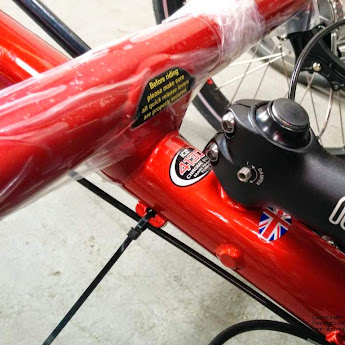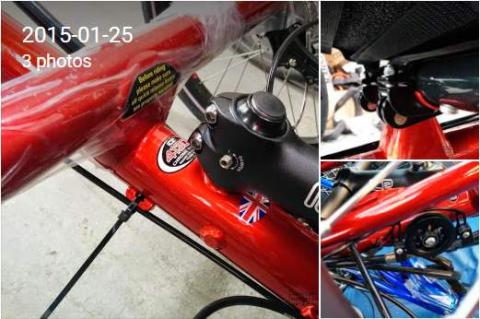A Catrike Trail E-Cat accessorized with a Shimano Alfine-8 drivetrain upgrade, Racktime rear rack with integrating basket, phone-mount, and extra mirror using AlphaBENT accessory mounts.
You are here
ICE Running Improvements / 2014-2015 model-year changes
One of the sillier things we've inherited from the auto industry is the concept of "model-years". The "model-year" is a fabrication arbitrarily used by the auto-makers to make their own products prematurely obsolete. By making their own cars obsolete, they create a perception among consumers that the older car versions are somehow inferior to the current model, and this drives [pun intended] consumers and dealers to pursue a never-ending cycle of buying and selling -- forever falling behind the curve of endless "improvements"... more and more thneeds which everyone, everyone needs.
Thankfully, the fine people behind ICE do NOT think in these terms. At ICE, the end of the year is just that, and when they have a new improvement, they just put it into the pipeline and it pops out magically whenever the next batch of parts get manufactured.
For this reason, we see a steady improvement in ICE trikes, and yet since the improvements interleave into the regular production cycle and the ICE people are so modest they see improvement as part of the job rather than something to trumpet far and wide, there is little attention paid.
This article is to bring much overdue attention to some really fine improvements which have found their ways into ICE trikes just in the past 1/2 year:
 Steering damping: The ability to introduce dynamic friction into the steering system is quite useful. In engineering, this is used to dampen systems that might otherwise have resonant oscillation. In trikes, this resonance is called "shimmy". Over the years, we've seen fewer than one handful of ICE trikes with any user-reports of shimmy, however, there have been a couple of bugaboos that would have been resolved much more easily if we had been able to just tighten up the damping in the steering system.
Steering damping: The ability to introduce dynamic friction into the steering system is quite useful. In engineering, this is used to dampen systems that might otherwise have resonant oscillation. In trikes, this resonance is called "shimmy". Over the years, we've seen fewer than one handful of ICE trikes with any user-reports of shimmy, however, there have been a couple of bugaboos that would have been resolved much more easily if we had been able to just tighten up the damping in the steering system.
Now, ICE trikes have steering damping. Look for the little set-screw on the handlebar pivot.
- Chain-tube restraint: On trikes, the chaintube tends to get pulled slightly forward on the drive-chain and slightly backward on the return-chain. For this reason, something needs to restrain the chaintube to keep it from migrating forward or backwards. On an ICE trike, the return chain tube is held with a small plastic clamp at the idler-pulley bracket. The drive-side chaintube, however, is separated into forward and aft sections.
 The forward tube is restrained using the same plastic clip, but the tube is held loosely to allow it to move with changes in the front gearing, a flare at the aft end of the tube has the dual function of guiding the chain into the tube gracefully while simultaneously preventing the tube from sliding forward through its loosely held clamp.
The forward tube is restrained using the same plastic clip, but the tube is held loosely to allow it to move with changes in the front gearing, a flare at the aft end of the tube has the dual function of guiding the chain into the tube gracefully while simultaneously preventing the tube from sliding forward through its loosely held clamp.
This leaves the aft drive-chain tube and ICE has long restrained this tube with a perfectly placed stainless-steel crimp (crimped vertically to allow perfect chain passage). Unfortunately, with many cycles [pun] and lots of use, the crimp can loosen unexpectedly allowing the tube to move forward into the idler pulley. This failure, though rare, is surprisingly difficult to resolve without a lot of duct tape.
ICE now make the aft chain-tube with a double-crimp. Thank you, ICE-people!
- Quick-release seat clamps: For an eternity, ICE seats have been held at the forward point by a steel cradle that is part of the frame. The cradle is semicircular, allowing the seat frame to rest in it when placed from above. A simple plastic ring kept the seat from moving upwards in the unlikely event of upward force. For a while, ICE used a quick-release lever to allow the plastic ring to be loosened and tightened rapidly with no tools. However, it was too easy for the lever to come loose and fall off. Since the plastic ring is only a retainer rather than a structural component, a missing retainer might not be noticed for a long time and by that time, the lost lever would be long gone -- left behind on the side of the road.
 Eventually, ICE gave up on the levers and started using plastic thumbscrews with a retention nut. The retention nut kept the thumbscrew from getting lost, but the plastic thumbscrews took an extra ten seconds out of your day when you actually took the seat off to fold it.
Eventually, ICE gave up on the levers and started using plastic thumbscrews with a retention nut. The retention nut kept the thumbscrew from getting lost, but the plastic thumbscrews took an extra ten seconds out of your day when you actually took the seat off to fold it.
Enter the new quick-release seat clamps.... No longer made of mere plastic and sporting a long positive-action quick-release lever, these are seat retention levers for the long-term. Now, the seat clamps down and actively holds the seat in its cradle. Now, the lever releases in a snap. On the flip side, the lever pops into locking position with an active click and you know you are set to roll! Nice job, ICE!
Image gallery
Information
A fire in the early morning of 5 June 2024 destroyed our neighbor business, MidCentury Sacramento. AlphaBENT escaped the worst of it and is back up and running.
Classifieds
Azub, Bionx, Catrike, GoSwiss, ICE, HP Velotechnik, Greenspeed
Join AlphaBENT in welcoming HP Velotechnik during their 2017 West Coast Tour.

